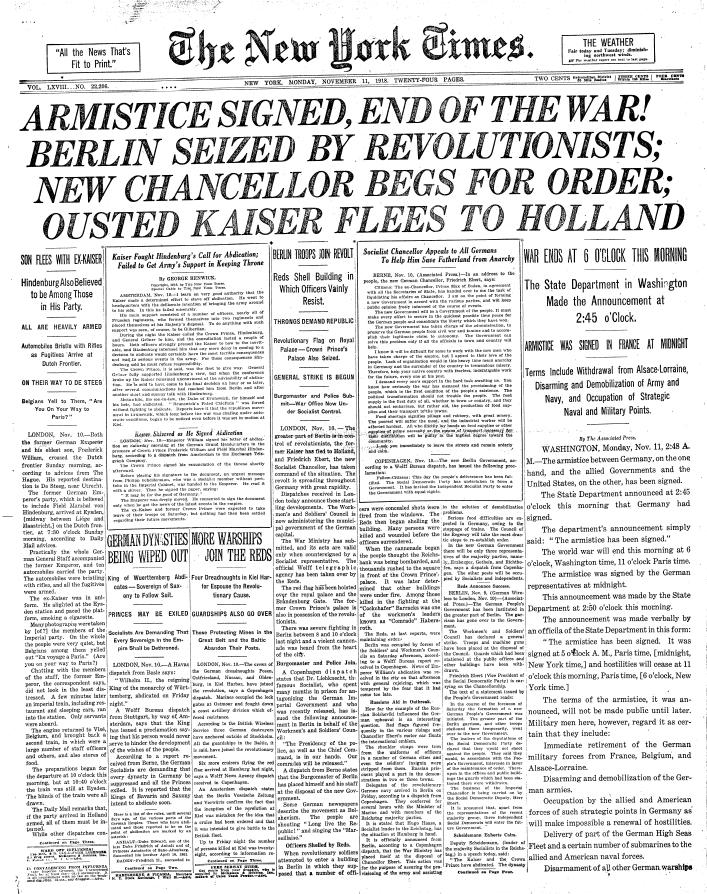|

|
Armistice Day
Armistice Day is commemorated every year on November 11th to mark the armistice signed between the Allies of World War I and Germany at Compiegne, France, for the cessation of hostilities on the Western Front of World War I, which took effect at eleven o'clock in the morning, the "eleventh hour of the eleventh day of the eleventh month" of 1918. The armistice initially expired after a period of 36 days. A formal peace agreement was only reached when the Treaty of Versailles was signed the following year. The date is a national holiday in France, and was declared a national holiday in many Allied nations. In some countries Armistice Day coincides with Remembrance Day and Veterans Day, and other public holidays. Armistice Day is not celebrated in Germany, but a German national day of mourning, Volkstrauertag, has been observed on the Sunday closest to November 16th since 1952.
On November 11, 1919, U.S. President Woodrow Wilson issued a message to his countrymen on the first Armistice Day, in which he expressed what he felt the day meant to Americans:
ADDRESS TO FELLOW-COUNTRYMEN
The White House, November 11, 1919.
A year ago today our enemies laid down their arms in accordance with an armistice which rendered them impotent to renew hostilities, and gave to the world an assured opportunity to reconstruct its shattered order and to work out in peace a new and juster set of international relations. The soldiers and people of the European Allies had fought and endured for more than four years to uphold the barrier of civilization against the aggressions of armed force. We ourselves had been in the conflict something more than a year and a half.
With splendid forgetfulness of mere personal concerns, we remodeled our industries, concentrated our financial resources, increased our agricultural output, and assembled a great army, so that at the last our power was a decisive factor in the victory. We were able to bring the vast resources, material and moral, of a great and free people to the assistance of our associates in Europe who had suffered and sacrificed without limit in the cause for which we fought.
Out of this victory there arose new possibilities of political freedom and economic concert. The war showed us the strength of great nations acting together for high purposes, and the victory of arms foretells the enduring conquests which can be made in peace when nations act justly and in furtherance of the common interests of men.
To us in America the reflections of Armistice Day will be filled with solemn pride in the heroism of those who died in the country's service, and with gratitude for the victory, both because of the thing from which it has freed us and because of the opportunity it has given America to show her sympathy with peace and justice in the councils of nations.
WOODROW WILSON
The United States Congress adopted a resolution on June 4, 1926, requesting that President Calvin Coolidge issue annual proclamations calling for the observance of November 11 with appropriate ceremonies. A Congressional Act (52 Stat. 351; 5 U.S. Code, Sec. 87a) approved May 13, 1938, made November 11 in each year a legal holiday: "a day to be dedicated to the cause of world peace and to be thereafter celebrated and known as 'Armistice Day'."
In 1945, World War II veteran Raymond Weeks from Birmingham, Alabama, had the idea to expand Armistice Day to celebrate all veterans, not just those who died in World War I. Weeks led a delegation to Gen. Dwight Eisenhower, who supported the idea of National Veterans Day. Weeks led the first national celebration in 1947 in Alabama and annually until his death in 1985. U.S. Representative Ed Rees from Emporia, Kansas, presented a bill establishing the holiday through Congress. President Dwight D. Eisenhower, also from Kansas, signed the bill into law on May 26, 1954. It had been eight and a half years since Weeks held his first Armistice Day celebration for all veterans. Congress amended the bill on June 1, 1954, replacing "Armistice" with "Veterans", and it has been known as Veterans Day since. President Reagan honored Raymond Weeks at the White House with the Presidential Citizenship Medal in 1982 as the driving force for the national holiday. Elizabeth Dole, who prepared the briefing for President Reagan, determined Weeks as the "Father of Veterans Day".
While the holiday is commonly printed as Veteran's Day or Veterans Day in calendars and advertisements (spellings that are grammatically acceptable), the United States Department of Veterans Affairs website states that the attributive (no apostrophe) rather than the possessive case is the official spelling "because it is not a day that 'belongs' to veterans, it is a day for honoring all veterans."
|

